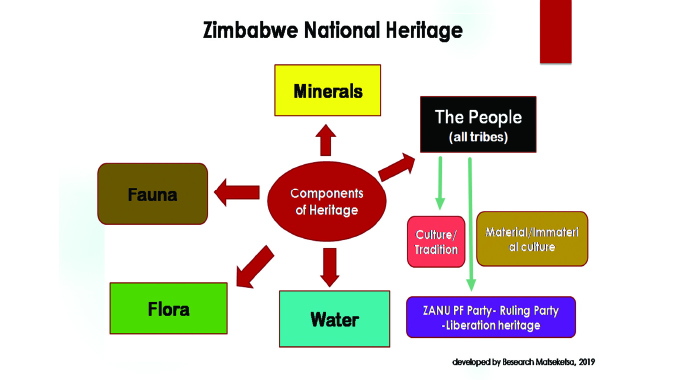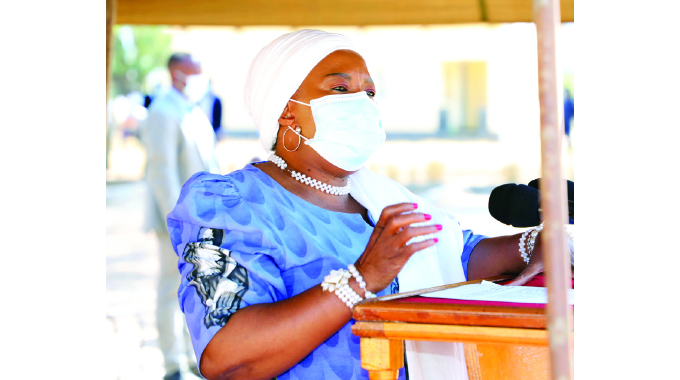Benefitting from heritage resources towards Vision 2030 attainment

Besearch Beloved Matseketsa and Taurai Mutoti
Congratulations Zimbabwe for having travelled this far in unity and harmony as we celebrate Heroes and Defence Forces Day holidays.
This article appreciates the sacrifices made by both the living and departed dear comrades for the liberation of our motherland. It was not a walk in the park, but a tough one and a gruesome moment where the veterans of the liberation struggle shed tears when discussing their experiences.
However, the article unpacks how Zimbabweans can benefit from what the veterans of the liberation struggle fought for, national heritage, and how our natural resources can be used to achieve an upper middle income economy (Vision 2030).
This year presents a unique opportunity for the country to celebrate from a new and renounced perspective where the country through President Emmerson Mnangagwa is implementing Heritage-based Education 5.0 (research, teaching, community service, innovation and industrialisation) so that we produce competitive goods and services for local consumption (import substation) and export excess (foreign currency earning).
For a country to economically develop, there is need to harness our natural resources, apply innovations followed by creating jobs through industrialisation.
Our national heritage has been scientific and technologically given the way our ancestors engaged in dentistry, archaeology, agriculture and areas such as Hwedza (iron smelting) were more advanced producing tangible products from iron production. What is Zimbabwe’s national heritage?
Defining national heritage
Natural Heritage Resources encompasses five components, namely
(i) the minerals
(ii) the flora and
(iii) the fauna
(iv) water
(v)the people
All the five components are anchored on the land. It is this land that liberation fighters fought for after it was taken from our ancestors without their consent in 1890 (colonisation).
Land deprivation (minerals, fauna, flora, water, and the people) and alienation was one of the top grievance that prompted sons and daughters of Zimbabwe to fight the colonialists until they won independence in 1980. It starts from the ownership of land and everything that grows and lives on it and everything buried underneath. That is why at one point Zanu PF coined the slogan, “Land is the economy and economy is land”.
From land that is where we have arable soils for agriculture, minerals such as gold, diamonds, and platinum.
Zimbabwe also has naturally occurring resources such as the balancing rocks caves (Chinhoyi Caves), water bodies and lakes that can be exploited for tourism.
From the same land we have potential Nyanga, Victoria Falls, Domboshava, and Chimanimani and may other places.
Flora is very important for people and animal survival in that we get medicines to cure various ailments. Flora has been used by indigenous people since time immemorial in gynaecology and therapy producing excellent results.
Therefore, the thrust of the heritage-based education system is meant for example, to allow students and medical professionals to research on traditional medicines (herbs) and how best they can be processed, packaged and consumed through scientific knowledge and Indigenous Knowledge Systems (IKS).
Of late, the country has been flooded with herbal medicines from India and China. Some of such medicines are in Zimbabwe but we pay through the nose for the lack of applying innovations.
There are efforts being made in order to benefit from this multi-billion-dollar heritage business at a local level, but a lot is needed to unlock the benefits until we export to other countries.
It is unfortunate that some Zimbabweans limit heritage to the cultural component but with little attention to scientific and economic side of our national heritage.
National heritage as a driver of the liberation struggle
We cannot talk of development of the contemporary Zimbabwe without relating to the colonial situation we once unfortunately found ourselves in.
Colonialism as we know, started in 1890 led by Cecil John Rhodes and the British South Africa Company (BSAC) which ran for almost close to a century to 1980 and ended through a brutal, protracted liberation struggle was mostly anchored on the exploitation of natural resources in the country.
The key reason why the West led by Britain, France, Portugal, Belgium and Spain embarked on colonialism was to wrestle and exploit the natural heritage resources that are endowed in Africa and Zimbabwe.
It was also from the same realisation that these erstwhile colonial powers were exploiting Zimbabwe’s land through agricultural, mining, plundering of natural granite rocks, tourism based on naturally occurring land formations and waterfalls, among others.
This led sons and daughters of the soil to resolve and be resolute towards the liberation struggle and attainment of independence. ZANU and ZAPU, through their military wings and participation of many foot-solders such as His Excellency, President Mnangagwa, Vice President Constantino Chiwenga, Defence and War Veterans Affairs Minister Oppah Muchinguri-Kashiri and Information, Publicity and Broadcasting Services Minister Monica Mutsvangwa, just to mention a few, were able to organise themselves so that they could fight for independence.
The objectives of the liberation struggle were not limited to the need for political control of the country, but were rooted in ultimate economic control of all factors of production by the majority black Africans.
These factors start from natural heritage resources as well as others that apply to development of a peoples’ aspirations. When one looks at the past 40 years we have spent as an independent country, we note that aspirations of the heroes that lie across many places within Zimbabwe, the provincial and National Heroes Acre as well as regionally at Tembwe, Zambia and Chimoio in Mozambique, it was a supreme sacrifice to get control and enjoy natural resources in the country.
Thus, although many causes can be attributed to the liberation struggle, it has to be submitted that the control of the natural resources was one of the key cogs that linked the fight for liberation.
Heritage-based driven economy towards attaining Vision 2030
To attain the vision that has been set by President Mnangagwa under the New Dispensation as espoused in the Transitional Stabilisation Programme (TSP) and the National Development Strategy 1 (NDS1), at the centre of it, exploitation of the country’s natural heritage resources is key.
Employment creation, improvement of infrastructure such as dams and roads, as well as the improvement of the economy and standards of living for the general populace to an upper middle income economy by 2030, are all anchored on the ability of the country to exploit, innovate and consume its natural resources and export excess.
It is here where we find that the country has more than 30 significant deposits of different minerals that include gold, diamonds, and platinum, chrome, iron and many others.
In terms of mining, President Mnangagwa recently launched an achievable plan that seeks to expand the sector into a US$12 billion economy. In terms of agriculture, the country through various Zanu PF programmes has managed to put land to good use through crop and livestock production. This year’s Heroes’ Day comes at a time the country is expecting a bumper maize harvest and a substantial expansion of winter wheat farming. This has resulted in the reduction of poverty, attainment of food security, reduction of imports, provision of raw materials to industry and the creation of employment. All this is anchored on the effective exploitation of the land which was fought for during the liberation struggle and the fast-track Land Reform Programme.
Besides these, Zimbabwe has other natural heritage resources that are being utilised for tourism such as Victoria Falls, Mana Pools, Mavhuradona Wilderness, Hwange and Gonarezhou National Parks, Mutarazi Falls and Vumba Mountains, among others. Tourism being a multi-billion dollar industry, there is potential to expand domestic and international tourism to benefit the country and help attain Vision 2030.
Lessons for the future
As a way of recommendation to practitioners, policymakers, medical students and professionals, legislators and Zanu PF structures, there is need to come up with solid frameworks on how our country needs to innovate and enjoy our national heritage.
Those in the procurement sector need to play a balance on considering local products and promote local producers so that we aim for import substitution.
Although no man can live in isolation as we are in a globalised village, the survival of Zimbabwe as a sovereign player depends on the ability to innovate our national heritage to compete at the global scale. Although the education sector introduced subjects such as Heritage Studies (primary and secondary level), there is need to ensure its implementation so that students are not deprived by not studying or learning about their national heritage. At tertiary level, much is happening in terms of aiming to produce goods and services and learning about Zimbabwe’s national heritage.
Heritage Studies therefore cuts across every discipline and as such its learning is vital towards achieving Vision 2030 without which our country will remain burdened with economic challenges.
A citizen deprived of understanding his/her national heritage is divorced from any economic activity because they don’t know the value and importance of what is found naturally around them. It is this consciousness that is needed for the country to move forward in all facets. There is need to decolonise the mind and as such this is the role of Chitepo School of Ideology.
Besearch Beloved Matseketsa (Resource Person @Chitepo School of Ideology), author of Total Heritage Studies textbooks Form 1-4 in use in schools, researched and published on National Security, International Relations.
Taurai Mutoti – Heritage Studies Author and currently an Msc International Trade and Diplomacy student at the University of Zimbabwe.








Comments